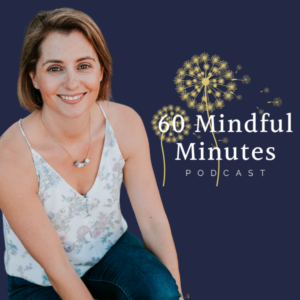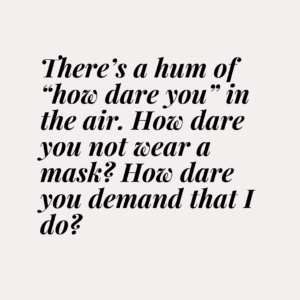I am a rule follower. Show me the guidelines, protocols and recommendations and you can be sure I will fall in line. According to Gretchen Rubin’s Four Tendencies paradigm, I am an “Upholder,” which means I have a propensity toward responding readily and openly to outer expectations.
If you’re part of this upholder camp, you’ve likely checked with the CDC guidelines for avoiding exposure to and stopping the spread of COVID-19, and you’re staying home except for important errands, distancing six feet apart when you do go out, and you’re probably wearing a mask.
Trouble is, it only takes a few swipes through your social feed or stroll through your local grocery store to discover that many, many people are not following “the rules.”
This can be unsettling, to say the least. Those of us who are giving up date nights, travel, outings and pastimes in order to help minimize transmission can see that many of our friends and family members are not. And with the numbers of infections climbing and with looming questions about how school will reopen (or not) and elections will be held (or not), we upholders sense our panic (and indignation) climbing too.

Have you checked out my 60 Mindful Minutes podcast? Learn more here.
Plus, who wouldn’t start to feel frustrated that only some of us are making the sacrifice to change our lifestyle in order to limit the spread of this virus?
To make matters worse, I am married to what Rubin labels as a “questioner.” Marc is not an indisputable rule follower like I am. His approach is more like: “I’ll use my own judgment to decide what’s best for me.” Needless to say, we are not seeing eye to eye on many fronts.
I’ve checked in with other rule followers and all report feelings of total frustration exacerbated by a sense of being out of step with people they call “friends and family.” Rule following can be lonely. It’s not easy being the person who misses out on gatherings.
Our news feeds are filled with COVID clashes, recorded on smartphones, of rule followers who confront others about not wearing masks or social distancing only to be coughed on, berated, or given an unsolicited lesson in American freedom.
So, how do we reconcile these differences in our individual approaches to COVID-19? The answer is: the same way we always have.
The truth is, we’ve always lived in a society where people are free to live life by their own rules. This idea that “I’ll do me and you do you” isn’t new. It’s just that now it’s more visible and the stakes feel much higher. Just as I am unlikely to change the behavior of a neighbor who doesn’t pick up his dog’s poop or a teenager vaping an e-cigarette, I am equally as unlikely to influence someone’s decision to wear a mask.
Jon Kabat-Zinn, author of several books including Full Catastrophic Living, has this invitation: let everything be your teacher. Frustration and discord are good teachers. To me, they have highlighted our level of disconnect with each other, how little tolerance we have for our differences, and how quickly we allow righteous indignation to rise and flourish in our minds.
 There’s a hum of “how dare you” in the air. How dare you not wear a mask? How dare you demand that I do? And what is it accomplishing? The answer is more disconnect, more separation and more misunderstanding. Nothing good ever comes from judging each other more and listening to each other less. Didn’t the divisiveness of the 2016 election teach us that? Haven’t we learned time and time again how difficult (and destructive) it is to try to change another person’s mind?
There’s a hum of “how dare you” in the air. How dare you not wear a mask? How dare you demand that I do? And what is it accomplishing? The answer is more disconnect, more separation and more misunderstanding. Nothing good ever comes from judging each other more and listening to each other less. Didn’t the divisiveness of the 2016 election teach us that? Haven’t we learned time and time again how difficult (and destructive) it is to try to change another person’s mind?
As far as I can see it, there is an alternative, and one that we are long overdue in embracing. Acceptance. I accept that each of us has the right to choose our own approach to this pandemic. I accept that I don’t agree with many people’s approach, and these may be people I love and respect. I accept that I have no control over other people’s behavior and how it impacts the rise in COVID-19 cases. I even accept that the more people spread this virus, the longer it will take for life to go back to normal and the higher the likelihood that I or members of my family could catch it.
To be clear, acceptance is not approval or apathy. It is acknowledging the as-is nature of my circumstances. I accept that today is Monday. I accept that I am 43 year’s old. I accept that a rain storm is likely to happen this afternoon. I do not reject these things because I recognize the innate truth of their existence. It is Monday. I am 43. There is a storm coming.
The old adage “it is what it is” isn’t a tagline for a hopeless or dejected life; it is the mantra of someone who can move through the day with a sense of steadiness and clarity. We are in a pandemic. Many people are choosing behaviors that increase the spread of the virus. The only behaviors I have control over are my own. It is what it is.
These days, I’m experimenting with a different approach. When I see someone without a mask, I feel compassion for them. They are probably assuming I am judging them and in return, likely judging me for my assumed judgment. Instead, I am sending them a silent wish: may you be well, may you be healthy, may you be at peace. Who knows if this impacts them but I do know this: it impacts me. And I am in charge of me.
Let’s assume that this is the new normal at least for the rest of 2020. Do I want to spend the rest of this year riddled with resentment, tormented by indignation and weighed down by judgment? I do not.
So, if I see you without a mask or I happen to glance at your crowded waterpark photos on Instagram, here’s what you can imagine I am thinking: you do you. I wish you’d make different choices but I respect your right to choose. And I wish you well.
___________________________________________________________________________________________
 Kristen Manieri is a writer, mindfulness teacher and the host of the weekly 60 Mindful Minutes podcast.
Kristen Manieri is a writer, mindfulness teacher and the host of the weekly 60 Mindful Minutes podcast.